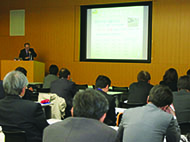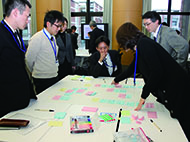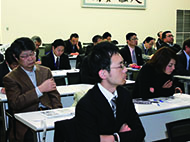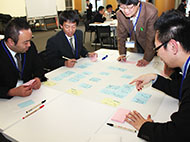Events
Workshop on Lessons from the 2011 Tohoku Disasters for Water Supply Systems in Kansai District
Date: March 2, 2012
Venue: Global Hall Jinyuu, Katsura Campus, Kyoto University
Organized by:
Kansai Research Community for Water in the Future
Co-organized by:
Kyoto University Global COE Program “Global Center for Education and Research on Human Security Engineering for Asian Megacities”
Number of attendants: more than 50
Report 198
Outline
‘Workshop on Lessons from the 2011 Tohoku Disasters for Water Supply Systems in Kansai District’ was held at Global Hall Jinyuu, Kyoto University at Katrsura Campus on March 2nd, 2012. The purpose of this workshop is to learn from the experience of City of Sendai Waterworks Bureau on the 2011 Tohoku Disaster and to discuss what we have to do for the disaster prevention from the presumed Tokai, Tonankai, and Nankai catastrophic disasters.
In the first session, the invited person from City of Sendai Waterworks Bureau has a lecture on their experiences, and lessons of the 2011 Tohoku Disasters. In addition, we would share the experiences of supporting some water utilities in Tohoku region.
In the second session, using the workshop method with the involvements of water professionals in Kansai region, we would discuss what we, the stakeholders on water supply system in Kansai region, have to do from the viewpoint of secure the urban human security after the presumed catastrophic earthquake and tsunami disaster in the West Japan, the Tokai, Tonankai and Nanakai earthquake.
Report
At first, Assoc. Prof. Hirayama, an organizer of this workshop and symposium and a chairperson of Kansai Research Community for Water in the Future, would address the objectives of this event.
In the first session, Mr. Sato (City of Sendai Waterworks Bureau) had a presentation on damages to water supply system in City of Sendai in the 2011 Tohoku Disaster and their emergency and restoration responses in the aftermath of 2011 disasters. Based on their experiences, he pointed out four subjects, which water professionals should overcome in the future; 1) Earthquake resistant counter measures, 2) Establishment of operating system for water, 3) More effective emergency water supply operation, 4) Management of resources for emergency restoration. In addition, Mr. Kumaki (Kobe City Waterworks Bureau) and Mr. Kadowaki (Hanshin Water Supply Authority) reported their activities of the 2011 Tohoku Disaster.
In the second session, all of participants were divided into five groups, and, using the workshop method, we would discuss the issues for water professionals in Kansai region to have to struggle for disaster prevention based on the first session lectures on the lessons from the 2011 Tohoku disaster.




